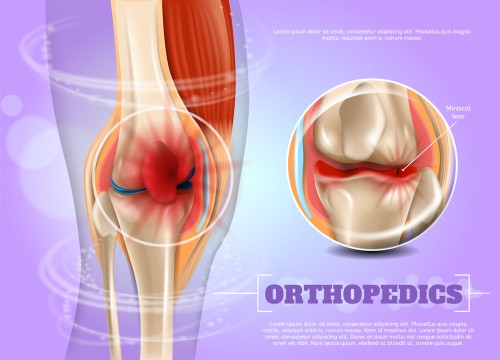Meniscal tears explained

There is a meniscus in the inner (medial) and outer (lateral) aspect of the knee. They are roughly ‘C’ shaped, and triangular in cross section. They act as a shock absorber, helping to distribute the weight of the body across the knee joint. Without this distribution there would be excessive forces on the bones in the leg, which could lead to early arthritis of the knee joint. They also help stabilise the knee. A torn meniscus is one of the most common knee injuries. Any activity that causes you to forcefully twist or rotate your knee, especially when putting your full weight on it, can lead to a torn meniscus. Anyone can tear a meniscus. In younger people, it is likely to result from a forceful injury, whilst in an older person, it may be part of knee degeneration.
Meniscal tears – symptoms to look out for
A torn meniscus can interfere with twisting, turning, squatting, or getting in and out of the car. The most common symptoms of a meniscal tear are:
- Pain in the knee joint
- Catching or locking of the knee
- Limited motion of the knee joint
- A feeling that your knee might ‘give way’
- Swelling
Meniscal tears – do I need surgery?
Maybe! Small tears may heal on their own. If the tear interferes with your activities and becomes symptomatic, surgery should be considered. If you suspect you have torn your meniscus, the first step is to seek medical attention to determine the extent of the injury. Following a clinical consultation, tests such as MRI can help diagnose the presence of a meniscal tear.
Meniscal tears – what are the surgical options?
Treatment for a meniscus tear will depend on its size, pattern, and its blood supply. If possible, it is best to repair the meniscus, to minimise the risk of developing arthritis later on. If repair is not possible, the damaged portion of the meniscus is trimmed, leaving as much normal meniscus as possible. This is usually done via ‘keyhole surgery’ (arthroscopy), under general anaesthetic.
If there is coexistent advanced knee arthritis, then you may require a knee replacement, rather than an arthroscopy.
Meniscal tears: LMcG Orthopaedics
Here at LMcG Orthopaedics, Doctor Lorcan McGonagle provides a range of orthopaedic surgeries and treatments. His specialties include knees, shoulder, elbow, wrist and hand, hip, foot and ankle.
If you have a question for Dr McGonagle and his Geraldton team, please get in touch with the clinic today on 08 9921 4847.
References
https://www.mayoclinic.org/diseases-conditions/torn-meniscus/symptoms-causes/syc-20354818
https://www.webmd.com/pain-management/knee-pain/meniscus-tear-surgery
